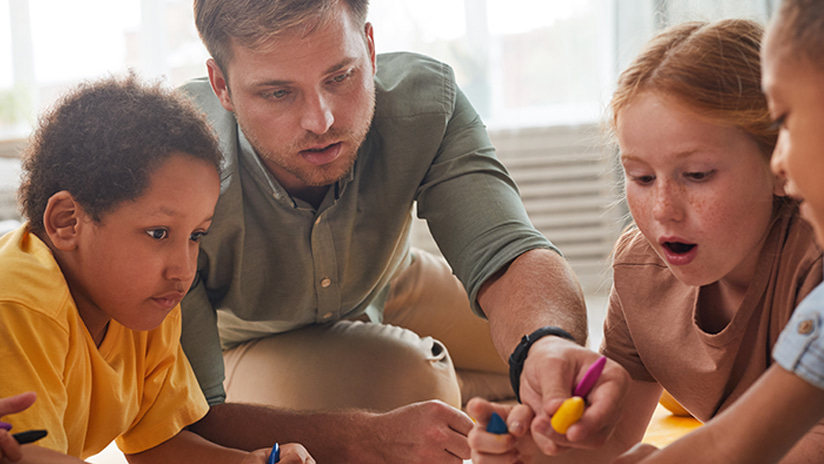Telstra Foundation: turning online safety into classroom fun
With support from Telstra Foundation, the Alannah & Madeline Foundation is delivering a suite of play-based activities for childhood educators to teach young children about technologies, digital networks and online safety.

Keeping kids safe online is always a top priority for parents raising children in the digital age. While some may find this a challenging prospect – and sometimes an overwhelming one – the one piece of advice every expert seems to agree on is that the earlier children learn about how to safely navigate the digital world, the better.
Most families try to control what their children access online, but this isn’t always possible.
- Sally Costin, Kindergarten teacher.
Sally, who teaches 3-5-year-olds at the Timboon and District Kindergarten in southwest Victoria says, “Families may allow their children to watch videos on ABC Kids or use an educational app such as Reading Eggs – but then the child finds themselves opening another app or being encouraged to buy something online.”
Playing IT Safe
Sally is one of hundreds of kinder teachers who’ve been experimenting with a new suite of resources from the Alannah & Madeline Foundation’s Playing IT Safe program – a portal that promotes safe and responsible online behaviour for Australian infants, toddlers and pre-schoolers. The three-year-old program recently refreshed its resources, which it’s now sharing with educators through 25 free online workshops funded by the Telstra Foundation and delivered by the Alannah & Madeline Foundation’s Content Program team.
Sally jumped at the chance to test some new strategies to help her pupils and their parents navigate the shifting sands of the internet.
“We have more parents approaching us these days for guidance on keeping their children safe online, and our kindergarten takes this really seriously,” she says. “So it’s great to have a collection of resources and strategies developed by experts to help us start these big conversations before school – and help parents who are anxious to set limits and guardrails at home.”
Adaptable content
Run in conjunction with Early Childhood Australia and several local councils, the workshops have reached 400 people – mostly kindergarten teachers and early learning centre staff. As well as introducing the new resources, they’ve given educators a chance to rate their most successful activities (‘Taking a photo’ and ‘Book corner’ are current favourites) and to tell the content team of useful adaptations they’ve used in class.
Playing IT Safe has separate games and activities for infants and toddlers, and for pre-schoolers. The games include everything from taking apart old devices to building cardboard robots and computers, to practising taking photos – with all the consents this entails. The activities feature more tangible lessons on how information is shared, how to protect people’s privacy, managing passwords and popups, and other e-safety skills.
Alannah & Madeline’s Emily Wilden says, “It’s all about starting discussions on the ‘basics’ of who can see your posts and how, protecting your friends, getting consent, and not believing everything you see or read,”
We don’t want to frighten children off the internet, which is vital for everyone, but we do want them to have full knowledge of how to keep them and their friends safe.
- Alannah & Madeline Foundation Content Program Advisor, Emily Wilden.
Asking children’s permission
The concept of permission is one Sally Costin takes very seriously at work – although she admits this hasn’t always been the case. “In the past we’ve taken photos of children and shared them with families through on online platform,” she says. “However, it’s important to ask the children for permission to take their photo, to advocate their agency and respect their rights.
“Having your photo taken and shared with others can be confronting for some children. Even when a child is very young, it’s important to ask permission if they want their photo taken, as it establishes it as the right thing to do.”
Sally believes it’s vital to have these conversations with families before school starts – and you don’t need a computer to teach them. “We have a strong play-based pedagogy and the Alannah & Madeline Foundation’s resources fit in well – helping us explain how the Internet works, the good stuff and the risks, without having to go online or use on iPad to teach them.
“These little things like seeking permission to write about people or take their photo – these are important lessons that will stay with children. As adults, we may understand that once stuff is up on the Internet, it’s potentially there forever – but for a child, they need to be taught this. Once you send a message or a photo, just because you only sent it to your best friend doesn’t mean it won’t be seen by anyone else.”
More information
About Telstra Foundation
Through the Telstra Foundation, we invest in social innovation enabled by technology. We’re focussed on youth wellbeing and building digital capacity in young people and the non-profit organisations that support them.



